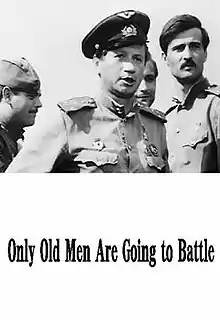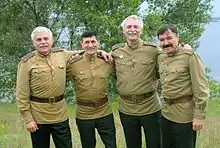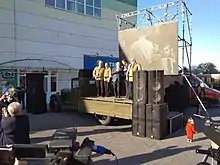Only "Old Men" Are Going Into Battle
Only «Old Men» Are Going Into Battle (Russian: В бой идут одни «старики», romanized: V boy idut odni "stariki"; one of the meanings of the Russian idiom «old man» is «most experienced person») is an iconic 1973 Soviet war drama black-and-white film produced in the Ukrainian SSR about World War II fighter pilots, written and directed by Leonid Bykov, who also played the lead role as the squadron commander.
| Only "Old Men" Are Going Into Battle | |
|---|---|
 | |
| Directed by | Leonid Bykov |
| Produced by |
|
| Screenplay by |
|
| Starring | Leonid Bykov |
| Music by | Viktor Shevchenko |
| Cinematography | Vladimir Voytenko |
| Edited by | M. Zorovoy |
Production company | |
Release date | 1973 |
Running time | 92 min |
| Country | Soviet Union |
| Language | Russian |
Screenplay by Leonid Bykov, Yevgeny Onopriyenko and Aleksandr Satsky.
Original music by Viktor Shevchenko, cinematography by Vladimir Voytenko. Runtime 92 min. Production by Dovzhenko Film Studios.
Plot
The film combines two storylines: the main war drama plot is runs in parallel with vivid artistic performance — the fighter squadron doubles as an amateur musical group during rest time, led by its enthusiastic commander turned conductor.
The title comes from two scenes in the film, where the squadron is facing very hard dogfights with German fighter planes, so only «old men» are sent up, while those fresh from flying school have to wait on the ground together with the mechanics. Soon, of course, the newcomers have replaced most of those veterans and have become «old men» themselves, taking to the skies while a new group of newcomers wait on the ground with the mechanics.
Plot Summary
The movie begins in the late summer of 1943 during the Battle of the Dnieper.
The pilots of the 2nd Squadron of the Fighter Aircraft Guard Regiment are returning from the mission. However, the commanding officer, captain Titarenko, also known as «Maestro», is missing. Nobody (except for Makarych, the technician) even hopes he make it, since he didn’t even had enough fuel, but when suddenly the German Messerschmitt Bf 109 shows up and lands on the airfield. It turns out that Maestro was shot down behind the enemy lands, however, the advancing USSR infantry saved him and he received a war trophy aircraft on an advance airfield.
The next day the reinforcements come to the regiment and are being assigned to the squadrons. Several newcomers, including Second Lieutenant Aleksandrov and Third Lieutenants Shchedronov and Sagdullayev, ask for a place in a 2nd Squadron. Titarenko inquires about their musical skills: 2nd Squadron is also known as «Singing Squadron», since at a free time they perform as an amateur orchestra with the commander himself being the conductor. Shchedronov sings «Darkie», earning the corresponding nickname.
Having only had a brief chat with reinforcements, the «old men» take off to intercept a group of German bombers. Experienced pilots don’t allow the newcomers with them, saying only «you’ll have your share of fighting soon enough»: they know that the new pilots only received a basic training due to shortened curriculum, and are not battle ready.
They all return to the airfield safely, however, Maestro is furious: his wingman, First Lieutenant Skvortzov, left the battle without permit, and it appears he did so not for the first time. They have a serious discussion and it turns out that during the Battle of Kursk Skvortzov had barely survived an encounter with German ace pilot and since then has a subconscious fear of dogfights. Depressed Skvortzov asks to be released from an active duty and to be enlisted to an infantry regiment instead, however, Titarenko burns the report, deciding to give a friend another chance.
In between missions 2nd Squadron rehearses performances. Even Aleksandrov, despite being averse to music, plays tambourine and soon begins to run the rehearsals in lieu of the captain.
Eventually, the newcomers are allowed to fly. Aleksandrov crash lands his aircraft, destroying it in the process and receives a strict reprimand from the captain. However, he doesn’t take it seriously and light-heartedly goes to the field to catch some grasshoppers. Enraged Titarenko suspends lieutenant from flying and puts him on «eternal airfield duty», while the rest of the officers begin to call Aleksandrov «Grasshopper».
Titarenko leaves on a reconnaissance mission on a trophy Messerschmitt. In his absence, a light bomber Polikarpov Po-2, piloted by female officers Zoya and Masha, takes forced landing on the airfield. Sagdullayev promptly falls in love with Masha, earning himself a nickname «Romeo».
Titarenko, who returned from a recon mission, confirms an info about a large group of a German tanks nearby. When he decides the reinforcements (except for Grasshopper) are battle ready, he performs another reconnaissance flight. He finds out that Germans have camouflaged their tanks with hay bales and sheds, but he’s shot down on his way back. Maestro is saved by an allied infantry, which, however, takes him for a German pilot. They aren’t persuaded neither with his Soviet uniform nor with his perfect russian language, and try to lynch him. However, when an infantryman slaps Titarenko in the face, he punches the soldier back, knocking him from his knees — that reassures the rest of the soldiers, who are sure that the German wouldn’t try to fight back in a situation like this.
The infantrymen gift captain a horse, which he uses to get back to an airfield. Having returned, he learns from Makarych that during his absence Darkie has been killed: he was practicing cooperative actions with his partner and was shot down by a Focke-Wulf Fw 190 ace.
In the meantime, Romeo confesses his love to Masha.
Titarenko joins CPSU and receives a task to lead newcomers by example and to demonstrate them vulnerability of frightening Göring’s ace pilots. Maestro challenges Germans to a «joust», but at the very beginning of a fight he decides that this is the last opportunity for his wingman to prove himself. Titarenko feigns a weapon malfunction, putting himself in a mortal peril, and Skvortzov overcomes his fear and comes to the rescue, shooting down one of the enemy aircraft.
The next day, German air forces perform a raid on the airfield. Still suspended from flights, Grasshopper steals commander’s fighter, takes off and shoots down an enemy aircraft, saving the base.
The squadron gives a performance, which, among the others, is attended by a female pilots from a nearby regiment. Skvortzov performs a song Moonlight Night. The next day he performs a suicide ramming attack, directing his flaming aircraft to an enemy railway.
More time passes. USSR territory is almost completely liberated from German occupation. The «old men» are preparing for battle, however, this now includes Romeo (first lieutenant, Maestro’s wingman) and Grasshopper (first lieutenant, 2nd Squadron commander), while Maestro himself is already a major and a regiment commander. Fifteen minutes before takeoff, Romeo asks Maestro’s permission to get married (since both he and Masha can be shot down any day) which Titarenko gives right away. Once again the «old men» take off, and the newcomers from the reinforcements are left on the airfield.
The regiment returns from the mission, but it turns out that Romeo is heavily wounded. He manages to make it to the airfield and lands safely, but succumbs to his wounds right afterwards. When Maestro, Makarych and Grasshopper go to the female regiment to deliver sad news to Masha, they learn that both Masha and Zoya were also killed that day. Makarych and Titarenko locate girl’s graves and promise to return here and to sing «Darkie» once again «from the beginning to the end» once the war is over.
Cast


- Leonid Bykov as «Maestro» Titarenko, commander of the 2nd Singing squadron
- Sergey Podgorny as «Darkie» Shchedronov, fighter pilot
- Sergei Ivanov as «Grasshopper» Aleksandrov, fighter pilot
- Rustam Sagdullayev as «Romeo» Sagdullayev, fighter pilot
- Yevgeniya Simonova as Masha, female bomber navigator
- Olga Mateshko as Zoya, female bomber pilot
- Vladimir Talashko as Skvortzov, fighter pilot, Maestro’s wingman and best friend
- Aleksei Smirnov as Makarych, Maestro’s technician
- Viktor Miroshnichenko as Pop, the fighter regiment commander
- Alim Fedorinsky as Alyabyev, fighter pilot
- Vano Yantbelidze as Vano, fighter pilot
- Aleksandr Nemchenko as Ivan Fedorovich, fighter pilot
- Vilori Pashchenko as Vorobyev, fighter pilot
- Gregory Hlady as Grasshopper’s technician
- Vladimir Volkov as political officer
- Dmitri Mirgorodskiy as infantry captain
- Yuri Sarantsev as Air Division commander
- Valentin Grudinin as chief of Air Army intelligence department
- Alexandr Milutin as fighter pilot
Script and production
Leonid Bykov’s childhood dream of becoming a pilot inspired his making of the film.
The story is based on the memoirs of the Soviet fighter ace Vitaly Popkov who fought with a real-life singing squadron boasting own amateur choir. The squadron even toured the Soviet rear with concerts and received fighter planes built with money donated by Soviet star musicians.
Most of the elder cast and production members fought the war themselves. Actor Aleksei Smirnov (Makarych) was a decorated war hero, an artillery sergeant; also a battlefield amateur musician as well.
Awards
The film won most of the Soviet bloc film prizes at the time, including the first prize in the 7th All-Union Film Festival in Baku in 1974.
Colorization
In 2009 a colorized version was released for TV and DVD, which resulted in a legal battle in Ukrainian courts between the copyright owners, Leonid Bykov’s daughter and Ukrainian Dovzhenko Film Studios, and the company behind the colorization, as the copyright owners claim that the colorization has been done against the wishes of Bykov, who intentionally chose to do the film in black and white, in order to match newly shot scenes with the newsreel material in the film. In May 2011, the District Court of Kiev ruled that the colorization was a breach of copyright and that the colorized version can’t be shown or rented in Ukraine.[1] The director re-worked the film’s script to suit being shot in black and white after being denied color film stock on the grounds that color film was reserved for films about socialist realism.[2]
References
- Суд запретил цветную версию «В бой идут одни «старики» [Court bans colorized version of "Only 'old men' are going into battle"]. Ahentstvo Stratehichnykh Doslidzhen’ Агентство Стратегічних Досліджень (in Russian). 23 May 2011. Retrieved 30 September 2019.
- Художественный фильм «В бой идут одни „старики“» [The film "Only 'old men' are going into battle"]. Первый канал [Channel One] (in Russian). 6 May 2016. Retrieved 30 September 2019.
External links
| Wikimedia Commons has media related to Only Old Men Are Going to Battle. |